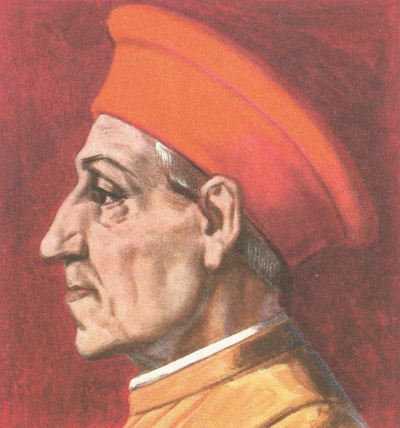Medici, Cosimo de' (1389–1464)

Portrait of Cosimo de' Medici, by Bronzino (the Medici Museum, Florence).
In the fifteenth century the states of northern Italy were exhausted by long wars between rival aristocratic parties. Power was passing into the hands of the merchants and bankers. Florence was a public, and elected her government; there were several rich and powerful families, and each of them tried to put pressure upon the government to their own advantage, and to the disadvantage of others. Public offices were held for a very short time, and the continual changing of those in power, and so of political policies, made it necessary for the various families to adopt a watchful and well-thought-out series of alliances and oppositions. Cosimo de' Medici was fortunate in his birth. His father, Giovanni, was an enormously wealthy merchant and banker, and had become one of the most powerful men, not only in Florence and in Italy. Princes, kings, and even the Pope himself borrowed money from him.
The chief rivals of the Medici family were the Albizzi, and Florence became the center of a struggle between these two powerful families. Cosimo's father was both wealthy and astute. He secured influence in his city by making the taxes of the common people lighter, and when he died in 1429 he left Cosimo not only a fortune of 179,000 gold florins but a position of power and popularity in Florence.
The early life of Cosimo
Cosimo di Bicci de' Medici was born in Florence in 1389. We know little or nothing of his life as a young man. He must have travelled a good deal, first with his father and later on his own account, visiting the various foreign banking and commercial houses of the Medici family. He married the Countess de' Bardi, who bore him two sons, Piero and Giovanni, the first of whom was to be the father of the famous Lorenzo the Magnificent, patron of the artists Michelangelo and Botticelli.
Cosimo was 40 when his father died in 1492. He carried on the family's commercial interests, extended the scope of his business, and founded new branches abroad. Under his direction wool and silk goods were manufactured. In particular, he opened offices for the import of precious merchandise from the East, where the old Byzantine Empire was breaking up, and much of value could be purchased and sold profitably in Europe. Though he lived modestly himself, in order to avoid arousing envy, he was open-handed with money and won popularity by continuing his father's policy of lightening the taxes of the poorer classes.
Ruler of Florence
The Albizzi, the great rivals of the Medici, were jealous of Cosimo's power, and worked against him. In 1433 Rinaldo degli Albizzi accused him of trying to set himself up as a dictator, and succeeded in having him arrested and condemned to exile for ten years. After only 20 days, however, Cosimo bribed his way out of the prison and retired to Venice, where he prospered and gained new friends and allies. Contrary to his enemies' expectations, he was able to extend his already vast business enterprises.
The following year a Florentine Signoria, or Council, was elected, which invited Cosimo to return. Rinaldo degli Albizzi fought against him but was banished, and the people of Florence, tired of the long struggles between different parties, accepted thankfully the rule of a benevolent despot.
For three decades Cosimo de' Medici governed the republic of Florence, not by holding important offices but simply through his wealth, his gift for keeping the people contented, and his shrewd foreign policy which helped to bring to an end the wars between the states of Florence, Milan, and Venice that had wasted northern Italy for years. Nobody was better informed than he, through his agents and branches scattered throughout the world, on the activities and conditions of other states.
Cosimo's only public office (held for no more than two terms) was that of Gonfaloniere, or Head of the State. His power, which descended to several generations of the Medici family, was strengthened by carefully selecting those who held public offices from among his own friends. He and his supporters got rid of their rivals by taxing them heavily, and virtually ruining them. Cosimo had a ruthless side to his character and declared that politics could not be mixed with sentiment; but though his rule was a despotism, it benefited Florence as well as increasing his own fortune.
Peace and prosperity brought about a wonderful flowering of the arts and learning. Cosimo sent out agents to buy old Greek and Latin manuscripts, and welcomed Greek refugee scholars from Constantinople. He founded the Platonic Academy, a body of learned men, which was later to be famous as a center of scholarship and philosophy under his grandson, Lorenzo the Magnificent.
Cosimo also founded a public library at St Mark's church, and was the patron of many outstanding artists and craftsmen, whose works and buildings adorned the city. Among these were Donatello, the sculptor, and Masaccio, who is really the father of the great Florentine school of painting. In public works and charities alone Cosimo spent some 400,000 florins, almost double the sum that he left to his heirs.
In the last years of his life he suffered much from gout. Nevertheless, he pursued to the end of his numerous private and public enterprises. When he died, in 1464 the Signoria, in recognition of all he had done for Florence, erected a tomb engraved with the words Pater Patriae – The Father of his Country.
Part of the family tree of the Medici
| Giovanni di Bicci | (1360-1429) |
| Cosimo | (1389-1464) |
| Piero | (1416-1469) |
| Lorenzo | (1449-1492) |
| Giuliano | (1453-1478) |
| Piero 11 | (1472-1503) |
